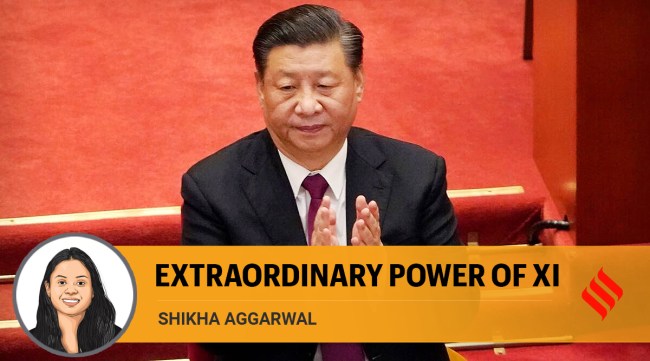Opinion A backlash against Chinese President Xi Jinping’s authoritarian style is unlikely at this point
Shikha Aggarwal writes: While Xi’s actions at maximising his authority have caused deep concerns within the higher echelons of the CCP, he by no means represents a novelty in Chinese elite politics in his quest for absolute power or his penchant for subverting norms.
 Chinese President Xi Jinping (AP)
Chinese President Xi Jinping (AP) As the 20th Party Congress of the Communist Party of China (CCP) approaches, the narrative around a perceived intra-party backlash against President Xi Jinping has been gaining traction. A recurrent theme in this paradigm relies upon juxtaposing Xi’s power grab and authoritarian style of politics against the more democratic and orderly system of governance established by Deng Xiaoping, and followed by Jiang Zemin and Hu Jintao.
While Xi’s actions at maximising his authority have caused deep concerns within the higher echelons of the CCP, he by no means represents a novelty in Chinese elite politics in his quest for absolute power or his penchant for subverting norms. Though Deng formulated the rules relating to succession and collective leadership, he also conceived the supra-party body in the form of the Central Advisory Commission to retain paramount control over the CCP. In his pursuit to realise his vision for the party, he removed one chairman and two general secretaries. During the ousting of Hu Yaobang and Zhao Ziyang, the highest party position Deng held was the Chairman of the Central Military Commission. Therefore, as per the “norms”, Deng had no authority to either ask Hu to dismiss the leaders behind the 1986 student protests or to even call the politburo meeting in 1989 that criticised Zhao and pressed for his exit. Further, Deng not only chose his successor but also designated the successor of Jiang Zemin which, going by the “norms”, did not fall under his prerogative.
As a technocrat-politician, Jiang did not exactly bypass the norms but rather held his sway by establishing an alliance of patron-protégé network. Jiang even used his “Shanghai Clique” to maintain his influence within the Hu administration. Therefore, Xi’s “power grab” cannot become the core reason for the dissenting voices within the CCP to coalesce into an effective opposition against him.
Moreover, Xi is the CCP’s own creation. Xi, with his “red” pedigree, was installed at the helm of Chinese politics to deal with the existential threat being faced by the CCP in the form of corruption. Consolidation of central authority was a necessity not only to tackle corruption but also to prevent the rise of regional power bases like the “Liaoning faction”. This alliance comprising Bo Xilai, Zhou Yongkang, and Xu Caihou not only commanded political power but virtually controlled the security apparatus of the country. Therefore, while to outside observers Xi was compromising norms relating to attacking fellow “princelings” and the retired members of the Politburo Standing Committee (PBSC), he had the tacit support of the party elders for these early actions.
Furthermore, the popularity of the “Chongqing Model” championed by Bo demonstrates that there was growing disenchantment among the general public with the course the party was taking. And it is here that Xi’s efforts to curb the coaching industry, rein in property developers, or his calls for “common prosperity” find resonance with people. Xi’s economic misadventures, and his proclivity to muzzle dissent, if not curtailed, will certainly affect his politics. However, the 20th Party Congress is not likely to be that moment.
The recent leadership changes at the Provincial Party Committees also bear out that Xi continues to be in control. Several of the current provincial party chiefs have work-experience in Fujian, Zhejiang, and Shanghai where Xi either served as the party secretary or governor. Further, Xi’s aides and party secretaries of Beijing, Shanghai, Chongqing, Guangdong, and Xinjiang are the top contenders for the next politburo/ PBSC, along with the political, propaganda, and security arms of Xi. However, in order to neutralise any resistance, Xi will also adopt some tactical measures such as the likely promotion of Hu Chunhua to the PBSC.
Factional rivalries are a reality of Leninist systems. However, their impact on a leader’s actual power is complex. Therefore, for now, the 20th Party Congress has Xi Jinping’s name imprinted on it not only in terms of personnel selection but on the structural norms and the emerging ideological landscape of the CCP.
The writer, a Senior Fellow at India Foundation, is currently in Taipei





